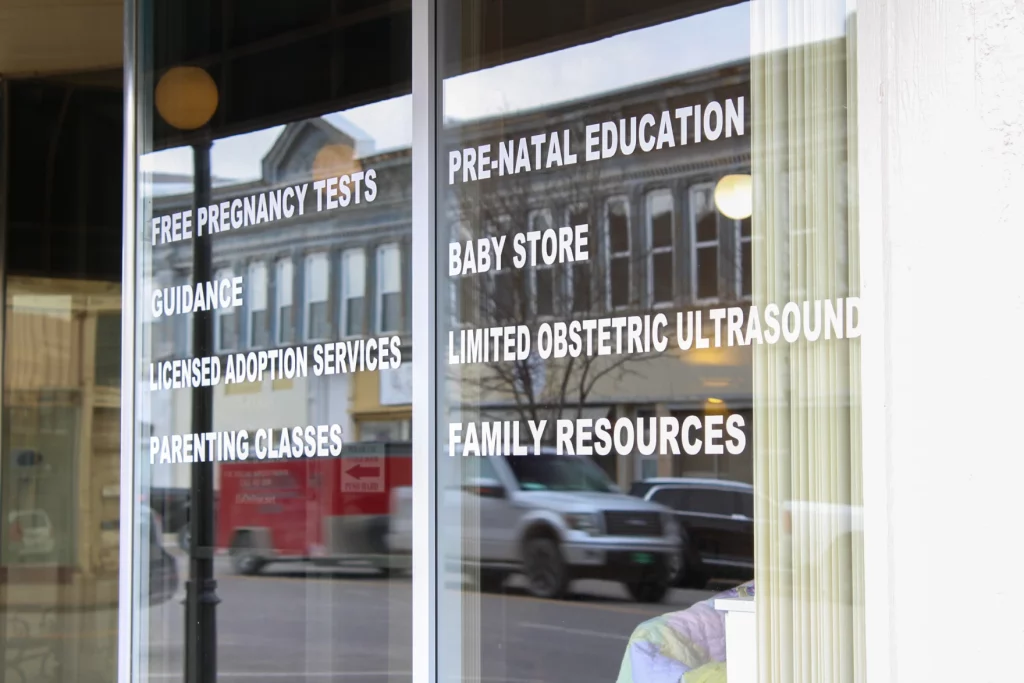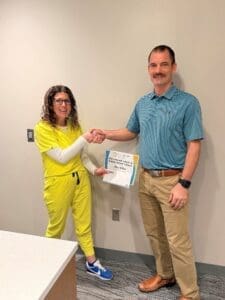Arkansas City, KS — If you think you might pregnant, and you don’t have the money to buy a pregnancy test, Family Life Services will give you one for free.
But first, you’ll have to answer a few questions.
“If they don’t have a support system, if their significant other or the assumed father is nowhere around — that automatically flags to us they’re already abortion-vulnerable,” said Marlana Mills, the organization’s executive director.
“Then,” she said, “the question that we ask prior to doing the pregnancy test is, ‘If this is positive today, what would be your decision? Are you thinking of abortion?’”
Family Life Services is one of a loose network of crisis pregnancy centers, or what critics call anti-abortion counseling centers. They’re controversial for what detractors see as a bait-and-switch approach that targets vulnerable women seeking abortions and lobbies them to carry their pregnancies to term instead.
Now, in a post-Roe Kansas — where abortion opponents faced a stunning defeat last summer — some lawmakers want to funnel millions of public dollars into those centers across the state.

That would amount to a significant taxpayer-funded investment in places like Family Life Services, whose sign advertises prenatal education, adoption services and guidance. A baby doll looks out the window onto the main drag of this Kansas town, a few miles from the Oklahoma border. Three-dimensional models of fetuses sit on display by the reception desk.
Anyone who’s pregnant or who has a young infant can come here, but the center aims to reach people dealing with unintended pregnancies.
“That’s really what we strive to do — to support and encourage people that find themselves in a hard spot,” said Krysta Wood, the center’s pregnancy education case manager.
Central to Family Life Services’ mission is discouraging the usually young, often low-income people who walk through their doors from getting abortions.
If staff suspect a woman is “abortion-minded,” they offer her an ultrasound — with the hope that it might sway her decision.
Once, Mills cold-called a woman whose friend alerted the center she wanted to end her pregnancy.
“I said, ‘I understand that you’re pregnant and that you are considering abortion. You have friends who love you that would like for you to talk with us. Would you like to make an appointment?’” Mills said. “It did not change her mind, but we were there for her.”

The Christian nonprofit tries to change minds by coupling anti-abortion counseling with practical support.
The building is stocked with cans of baby formula and donated cribs; a pastel-painted basement reveals rack after rack of baby clothes and shelves lined with tiny shoes. To get these items, parents need to earn “mommy bucks” by participating in parenting classes and demonstrating healthy habits, as determined by caseworkers.
Rather than persuasion, Mills sees the work as making it possible for those with unwanted pregnancies to choose alternatives to abortion.
“Convince is a strong word,” she said. “Our method is to provide them comfort and resources and tools to be able to parent — because a lot of people are scared and feel they have no other option (than abortion). We want to expand those options to them.”
‘Fake clinics’?
Crisis pregnancy centers — sometimes called “pregnancy resource centers” — are a key pillar of the anti-abortion movement. In Kansas, they outnumber abortion clinics more than six to one.
To supporters, they’re a compassionate answer to unintended pregnancy, filling a gap in social services for young parents.
But critics call them “fake clinics” that mislead people at their most vulnerable.

Some try to intercept people seeking abortions by using search engine optimization and carefully worded billboards, potentially delaying access to a procedure that is time-sensitive. Others — including centers in Wichita and Kansas City — sit next door to abortion clinics, sowing confusion when people show up for abortion appointments. Their ideological goals don’t always become obvious until someone finds themself in a counseling session or on an exam table.
And public health experts say they sometimes spread misinformation, discourage birth control use and push dubious medical services like “abortion pill reversal” — a controversial treatment that the American College of Obstetricians and Gynecologists says is unproven.
“They frequently provide inaccurate health information in order to reach their own anti-abortion, anti-contraception goals,” said Andrea Swartzendruber, a University of Georgia professor who studies the centers.
That can be harmful, she said, because many people who visit the centers believe they’re getting unbiased information from medical professionals.
But crisis pregnancy centers aren’t subject to oversight that would ensure that. Most states, including Kansas, don’t license, inspect or otherwise regulate the centers — despite sending them taxpayer money.
“While they often advertise themselves as medical facilities,” Swartzendruber said, “most of the people who staff crisis pregnancy centers are not clinically trained or licensed.”
That isn’t the case across the board. Mills is a registered nurse; Family Life Services brings in a volunteer sonogram technician to do ultrasounds.
But the center isn’t a licensed health care provider, or regulated in any way by the Kansas Department of Health and Environment. None of the state’s dozens of crisis pregnancy centers are. (The Kansas News Service identified 37. Anti-abortion groups, counting some without brick-and-mortar locations, say there are more than 50.)
And some masquerade as medical facilities, including using words like “medical” and “clinic” in their names or clothing their volunteers in white coats and scrubs. In 2018, the U.S. Supreme Court ruled states can’t require the centers to tell visitors they aren’t legitimate medical providers.
“It was a relatively narrow decision,” said Carrie Baker, a lawyer and professor at Smith College, “but it has discouraged a lot of states and cities from regulating crisis pregnancy centers.”
‘Surreal and condescending’
A few years ago, Kelsie Morris found herself at another of those centers after a positive home pregnancy test. She was newly married and between jobs. Money was tight. But abortion didn’t cross her mind.
“It was not where we thought we’d be when we started a family,” she said, “but we weren’t not excited about it, either.”
She wanted to confirm she was pregnant with a blood test. When she called Choices Medical Clinic in Wichita — which did not respond to a request for comment — she says staff told her they would do one for free.
But when she got there, they said they only did urine tests. And she says workers cornered her in the hallway while her husband was in another room and started asking invasive questions about her marriage and whether she was considering abortion.
“The entire experience was very surreal and condescending,” said Morris. “They didn’t want to believe that I wanted this baby — because their entire pitch was, ‘You’re safe. You don’t need an abortion.’”
A couple of weeks later, she went back for a free ultrasound, thinking she could deal with a few more questions.
Afterward, she said, she got a text from an unknown number: “We’re praying that you make the right decision.”
A Choices Medical Clinic staffer, she believes, had decided to contact her from their personal phone.
“So you use my personal file at the place where you work to try and sway my medical choices?” she remembers thinking. “The fact that you’re willing to breach that level tells me that I really shouldn’t be trusting you with anything else.”
Now, she says she wants other women to understand the centers’ ideological slant.
“‘Medical’ is in the name — that’s what you’re expecting,” she said. “I want to make sure people know what they’re walking into.”
Talk to women who’ve been to crisis pregnancy centers and you’ll hear stories like Morris’s over and over. Because the centers are not licensed health care providers, they don’t have to keep anyone’s information private. Many claim to follow federal patient privacy law, but no government agency is making sure they do.
That has new implications in a post-Roe era as more states outlaw abortions and more women travel to Kansas to get them. Abortion rights advocates have warned that the centers could turn over pregnancy data to law enforcement seeking to enforce abortion bans.
“The concern is that, if somebody goes to a (crisis pregnancy center) and gets an ultrasound and they say, ‘You’re five weeks pregnant’ — then later, that person turns up not pregnant anymore — that they could use that information to criminally prosecute them,” said Baker, the Smith College professor.

Millions at stake
Despite the controversy, Kansas is one of at least 17 states that already give crisis pregnancy centers some taxpayer money.
Two centers — Family Life Services and Embrace, a Wichita center — each receive tens of thousands per year through the Stan Clark Pregnancy Maintenance Initiative, a small state grant program designed to help low-income women carry pregnancies to term. But that’s paltry compared to many other states.
In the wake of a momentous vote last year that prevents Kansas lawmakers from banning abortion in the immediate future, abortion rights opponents have redirected their efforts into pushing for a dramatic expansion of that funding.
Lawmakers recently held hearings on legislation that would funnel up to $10 million to the centers through a sweeping tax credit program. Kansas residents and businesses would receive a 70% tax credit for every dollar they donate to a center — meaning that donating $1,000 would result in a $700 reduction in one’s tax bill. The proposal mirrors a similar tax credit in effect in neighboring Missouri.
Separate legislation that would directly send money to the centers, likely to the tune of several million dollars, is expected to be introduced soon.
The effort reflects a broader national debate about how to support those who carry unintended pregnancies to term in a country where abortion is becoming increasingly hard to get — even in states like Kansas, where it remains legal.
Center operators like Mills say more funding would allow them to advertise more, expand their hours and offer more services — perhaps even help with housing. She said several of the women Family Life Services has worked with in the past year were struggling with homelessness.
“Whatever we do,” she said, “we still just can’t do it all.”
But abortion rights advocates say it would effectively divert money from unbiased health care services and safety net programs.
“The legislation, if enacted, would encourage individuals and business to donate to CPCs rather than to other nonprofits that provide the full range of comprehensive sexual and reproductive health care services to patients,” Katie Baylie, director of legislative affairs for Planned Parenthood Great Plains Votes, said in written testimony.
She said giving tax credits for donating to the centers would mean Kansas “implicitly endorses the unregulated, unethical and harmful tactics of these organizations.”
Ashley Underwood, the director of Equity Forward, a research group that supports abortion rights, said the group’s research shows that government investments in the centers in other states often don’t reach their intended targets.
“We notice a trend across the country that, through these programs, dollars are being used towards overhead costs — making sure that employees and salaries are being paid instead of providing direct support to people,” she said.

And some say the money would further embolden organizations they argue are motivated by extremism — pointing to comments made by Dr. Scott Stringfield, the medical director of the Wichita center Morris went to, at the state’s annual March for Life in Topeka last month.
From the steps of the Statehouse, Stringfield encouraged protestors and politicians to “choose principle over pragmatism” like the terrorists behind the Sept. 11, 2001, terrorist attacks.
“We’re at the 21st anniversary of 9/11,” Stringfield said. “And an unobserved aspect of what went on there is that the terrorists, the men who were willing to pay the price of their lives to do such a heinous act when they flew those planes into the twin towers and into the Pentagon — you have to look at one thing: They were principled. They were willing to die for what they believed in.”
Stringfield later said in an email he was not trying to promote violence. But abortion rights groups and clinic operators say it reflects a win-at-all-costs mentality behind crisis pregnancy centers.
His remarks drew sharp criticism from a spokesperson for Trust Women, an abortion clinic next door to Stringfield’s center — and the clinic once run by abortion provider Dr. George Tiller, who was assassinated by an anti-abortion extremist in 2009.
“Anti-abortion extremists like Dr. Stringfield,” Trust Women spokesperson Zachary Gingrich-Gaylord said in a statement, “are explicitly and incredibly endorsing terrorism as a new front in their fervor to further control pregnant people and take away essential health care from our communities.”
The lobbying group Kansans for Life, which invited Stringfield to speak at the rally, declined to directly respond to his comments. In an email, spokesperson Danielle Underwood said the organization “has a long, documented history of supporting peace and never endorsing violence.”

A question of ethics
It’s impossible to separate the controversy surrounding crisis pregnancy centers from deeply entrenched arguments over abortion.
At Family Life Services in Arkansas City, Mills fundamentally disagrees with detractors who say organizations like hers are founded on the unethical premise of trying to curb access to health care they consider a human right.
“I would love for there not to be abortion, absolutely — that’s my belief,” she said. “Ultimately, we have to go home and feel that we did everything we could (to reduce abortions). But we also have to have a clear conscience — that we’re not going to do it unethically.”
She said she was saddened by stories of women feeling misled — or worse — by the centers.
“I would be very upset,” she said, “if anything like that happened here.”
And Mills echoed a refrain common among center operators when confronted with allegations of bad practices in the industry: despite occasional bad actors, she thinks most in the field strive to live up to their faith-based mission.
“It’s about integrity as a Christian agency,” she said. “If you’re lying to preserve life, it’s still not a good thing.”
Rose Conlon reports on health for KMUW and the Kansas News Service. You can follow her on Twitter at @rosebconlon or email her at conlon@kmuw.org.
The Kansas News Service is a collaboration of KCUR, KMUW, Kansas Public Radio and High Plains Public Radio focused on health, the social determinants of health and their connection to public policy.
Kansas News Service stories and photos may be republished by news media at no cost with proper attribution and a link to ksnewsservice.org.













